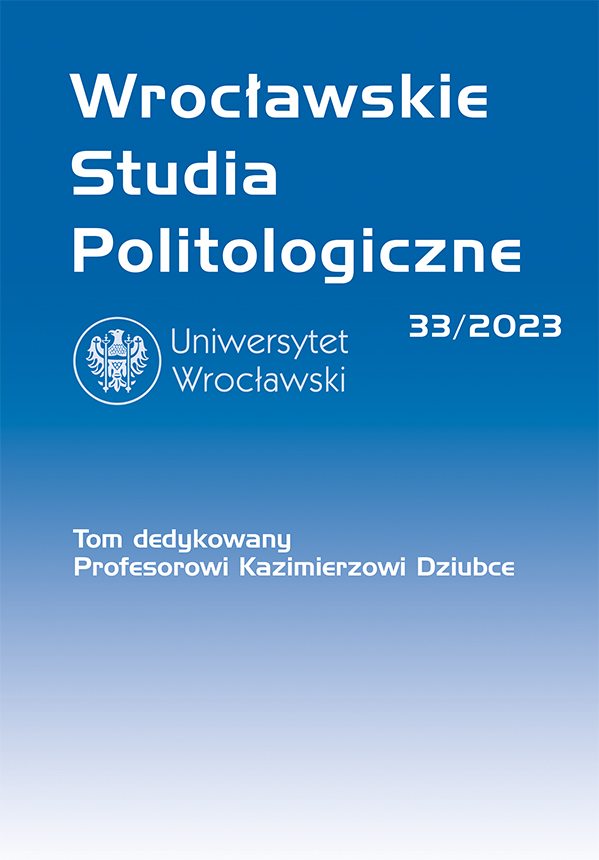

Artykuły

The central problem constituting the background of this text is to seek answer to the questions about the main strengths that change the state identity during the long term of its existence and evolution starting from the Holocen Age to Anthropocen. The main problem are the main changes or the driving forces that facilitate the potential of adaption to the real world. Among the effects of driving forces that facilitate the potential of adaptation to the real world which is changing in the long term.
It is my main thesis that central position in the processes of evolution and adaptation to the developing world was played by the human being. It means that the main idea of this text is to discuss human abilities to change our living space, forces changing the space, the social structure, and civilizational achievements.
The problem addressed in this article is directly related to the relationship between phenomena and occurrences which have been taking place in the real world for generation and which are substantial to the state and its ontological context.
Armitage D., Transtemporalne i transnarodowe horyzonty historii, „Studia Metodologiczne” 46, 2016.
Bauman Z., Życie na przemiał, Kraków 2004.
Blok Z., Teoretyczne i metodologiczne problemy politologii związane z państwem, [w:] M. Pietras, I. Hofman, S. Michałowski, Państwo w czasach zmiany, Lublin 2018.
Braudel F., Historia i nauki społeczne: długie trwanie, przeł. B. Geremek, Warszawa 1971.
Braudel F., Kultura materialna, gospodarka i kapitalizm XV–XVIII wiek, t. 2, Warszawa 1992.
Castells M., Społeczeństwo sieci, przeł. M. Marody, K. Pawluś, J. Stawiński, Warszawa 2007.
Castells M., Społeczeństwo sieci, przeł. M. Marody, K. Pawluś, J. Stawiński, z nową przedmową, Warszawa 2010.
Coen D.R., The First Cold War. The Environmental Lessons of the Little Ice Age, „Foreign Affairs” 93, 2014.
Cox R.W., Social Forces, States, and World Orders: Byong International Relations Theory, „Millenium” 10, 1981, nr 2.
Davies N., Europa. Rozprawa historyka z historią, Kraków 1999.
Devetak R., Postmodernizm, [w:] S. Burchill, R. Devetak, A. Linkater, M. Paterson, Ch. Reus-Smit, J. True, Teorie stosunków międzynarodowych, Warszawa 2006.
Dziubka K., O niektórych własnościach złożonej struktury przestrzeni międzynarodowej, [w:] W kręgu nauki o stosunkach międzynarodowych, red. A. Dudek, Wrocław 2015.
Dziubka K., Obywatelskość jako virtu podmiotu demokracji, Wrocław 2008.
Evans P., The Eclipse of the State? Reflections on Stateness in an Era of Globalization, „World Politics” 50, 1977.
Ferguson N., Complexity and Collapse, „Foreign Affairs” 89, 2010, nr 2.
Foucault M., The Archeology of Knowledge: And the Discourse on Language, London 1972.
Gałganek A., Historia stosunków międzynarodowych. Nierówny i połączony rozwój, t. 1: Idee, Warszawa 2013.
Gałganek A., Historia teorii stosunków międzynarodowych, Warszawa 2009.
Hoekstra J., Networking Nature. How Techology is Transforming Conserwation?, „Foreign Affaris” 93, 2014, nr 2.
Holsti J.H., The Necrologist of Interantional Relations, „Canadian Journal of Political Science” 4, 1985. Karwat M., Metodologiczne aspekty problemu ciągłości państwowej, [w:]
M. Pietraś, I. Hofman, S. Michałowski, Państwo w czasach zmiany, Lublin 2018.
Kaute W.W., W poszukiwaniu dobrego życia, Katowice 2011.
Kissinger H., Porządek światowy, Wołowiec 2016.
Linklater A., Men and Citizen in the theory of International Relations, London 1990.
Lyotard J.F., The Postmodern Condition: A Report n Knowledge, Manchester 1991.
Łoś-Nowak T., Funkcja predyktywna nauki o stosunkach międzynarodowych. Wyzwania i zagrożenia, „Studia Polityczne” 1–4, 1993, nr 5.
Łoś-Nowak T., Stosunki międzynarodowe. Teorie — Systemy — Uczestnicy, Wrocław 2000.
Mesjasz C., Organizacja jako system złożony, „Zeszyty Naukowe Akademii Ekonomicznej” 625, 2004.
Nye R.O., Nye J.S., Power and Interdependence, New York 2001.
Obuchowski K., Jednostka ludzka, „Czasopismo Psychologiczne” 2, 1996, nr 1.
Osiński J., Państwo w warunkach globalnego kryzysu ekonomicznego. Przyczynek do teorii państwa, Warszawa 2018.
Parker G., Global Crisis: War, Climate Change, and Catastrophe in the Seventeenth Century, New Haven 2013.
Pluckrose H., Lindsay J., Cyniczne teorie. O tym, jak aktywizm akademicki sprawiał, że wszystko kręci się wokół ras, płci, tożsamości — i dlaczego szkodzi to każdemu z nas, Warszawa 2022.
Poniewierski A., Jutronauci 2020. Naszej i sztucznej, „Gazeta Wyborcza”, 11.04.2020.
Popkiewicz M., Świat na rozdrożu, Warszawa 2012.
Stalder F., Manuel Castells. Teoria społeczeństwa sieci, Kraków 2006.
Suleyma M., Nadchodząca fala. Sztuczna inteligencja, władza i najważniejszy dylemat ludzkości w XXI wieku, Kraków 2024.
Szmyd J., O problemach edukacji integralnej i kłopotach współczesnego humanizmu, „Kultura — Przemiany — Edukacja” 6, 2018.
Ulanowski T., Ostatnia minuta, Warszawa 2023.
Weber M., Smith M., Problems and Issues in Foreign Policy Analysis, [w:] Foreign Policy in Transformed World, red. M. Weber, M. Smith, London 2002.
Wilczyński A., Znaczenie teorii złożoności w ekosystemie biznesowym, „Prace Naukowe UE we Wrocławiu” 2, 2011, nr 168.